Answer these simple questions and we will find you the BEST prices
Which type of solar quotes do you need?
It only takes 30 seconds
100% free with no obligation

Get up to 4 quotes by filling in only 1 quick form

Compare quotes and find yourself the best deal

Increase the value of your home by installing solar panels
- Householdquotes.co.uk
- Solar Panels
Solar Panels for Your UK Home: A Comprehensive Guide (2025)

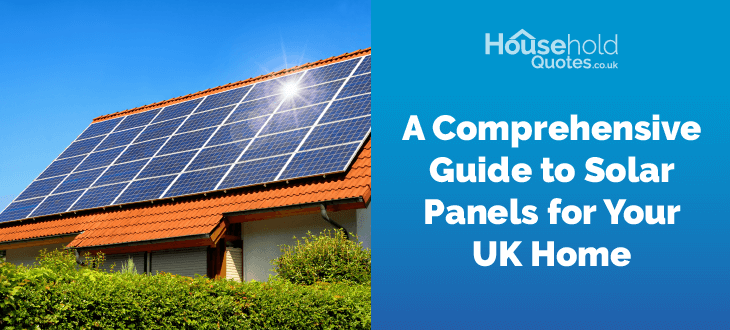
- Solar panels cost approximately £2,500 - £10,500 for a standard 2 or 3 bedroom house.
- You can save between £440 and £1,005 a year on your electricity bill by installing solar panels.
- The average solar panel installation has a break even point of 10 to 9 years and lasts around 25 years.
Thinking about installing solar panels for your home but not sure how they work? You’ve come to the right place. Put simply, solar panels convert sunlight into usable electricity for your home. However, the process is somewhat more complex than that. In this guide, we will walk you through how solar technology works, what its benefits are, and how you can reduce your energy bills with a solar panel system.
If after all this you are still on the fence about solar panels, you will want to bring your questions and concerns to a reliable solar expert. Yet, finding a professional you can trust can be a tedious process. After hours or even days of googling installation companies and reading reviews, you might still not have found what you’re looking for.
Fortunately, with our help, you can avoid wasting your time and energy and help you find the most efficient solar panels in the UK. All you have to do is fill in our 30-second form to request quotes from up to 4 solar panel installers operating in your area. This way, you can easily find a reputable professional to work with, as well as the best deal for your new solar panel installation. All quotes are completely free and come with no obligation. Click below to get started!
- Quotes from local installers
- Payment by finance available
- Save up to £915 per year
It only takes 30 seconds

- Are solar panels for homes worth the investment?
- How do solar panels work?
- How efficient are solar panels in the UK?
- How many solar PV panels do you need for your household?
- Which type of solar panel cells are the best for UK households?
- The best solar panel system for your UK home
- Solar panel installation: What is involved?
- Find the best solar panel suppliers near you
- Frequently asked questions
Are solar panels for homes worth the investment?
Solar panels in the UK are generally a good investment. This is because of the moderate weather conditions across the country and because your solar panels can have enough exposure to sunlight and daylight to generate electricity.
In the UK, solar panels can provide your home with energy year-round, which means that you will notice a change in your yearly electricity bills. For instance, with a 4kW solar panel system, which is the most common size for UK households, you stand to save up to around £440 yearly.
However, savings figures vary depending on the size of your solar panel system, the efficiency of your solar panels, as well as on your household’s energy consumption habits.
How much do solar panels cost?
Today, the domestic solar panel price is somewhere between £2,500 - £10,500. Prices vary depending on the size of the solar panel system you require. In addition, you will also need to account for installation costs when calculating how much you will spend on your new solar panel system. Below, you can find estimated costs for different solar system sizes, including labour costs.
| Solar Panel Costs Per System Size | |||||
|---|---|---|---|---|---|
| Household Size | Average Electricity Consumption | System Size | Estimated Costs | Estimated Labour Costs | Estimated Total Costs |
| Small; 1-2 bedrooms | 1,800 kWh | 2 - 3kW | £2,500 - £5,500 | £600 – £1,000 | £3,100 – £6,500 |
| Medium; 2-3 bedrooms | 2,700 kWh | 4 - 5kW | £5,000 - £8,500 | £1,000 – £2,000 | £6,000 – £10,500 |
| Large; 4-5 bedrooms | 4,100 kWh | 6kW | £9,500 - £10,500 | £2,000 – £3,000 | £11,500 – £13,500 |
These costs are estimates. Get a local installer QUOTE now!
Hopefully, these estimates have given you a better indication of how much solar panels cost. However, several factors can increase or lower your expenses.
For instance, if you choose to install solar battery storage with your panels, you will also need to account for solar battery prices when calculating your total costs. If you do want to add a solar battery to your system, you'll want to choose the best solar battery storage in the UK for your home. Discover more about 3kW solar systems with battery.
The panel design can also be a factor. For example, solar roof tiles can be more expensive than standard solar panels. In general, integrated solar panels come to the same cost as standard panels.
How much can you save by installing solar panels?
How much you will end up saving on your yearly electricity bills with solar panels will depend greatly on the size of your system, its efficiency, and your household’s energy consumption. To maximise your savings, you will want to ensure that you choose the right solar panel system size that can tend to your energy needs.

For instance, with a 3kW system, which costs around £4,500 - £5,500, you can expect to save up to around £440 per year. With this system size, your investment will pay off in around 9 years. Since most solar panels maintain high efficiency for 25 years or longer, this means that even after breaking even, you will get to enjoy green energy and savings for years to come.
When it comes to a 4kW system, you can save up to £440 yearly. Keeping in mind that the solar panel price for such a system is between £5,000 - £6,000, this means that the break even point of your investment would be in around 8 years.
As for a 6kW solar panel system, the costs are higher, ranging anywhere between £9,500 - £10,500. In terms of savings, they can be up to £1,005 per year. With these figures, you can expect to break even on your investment in solar panels after 10 years.
12kW solar panel system costs between £12,000 - £13,000 on average. Based on your energy usage, current energy prices, and the amount of sunlight in your area, the approximate break-even point can be anywhere between 4.9 and 5.7 years.
A solar panel installer can help you establish your energy consumption requirements and what kind of system would work best for your home. If you are ready to consult a specialist, you will want to find someone you can trust. Doing so on your own can be exhausting, as it can take hours or even days to research installers.
Thankfully, we’ve done the hard work for you and vetted solar experts across the country. All you need to do now to get in touch with them is fill in our 30-second form and request quotes for a solar panel installation. You will then hear back from up to 4 local installers and you can compare their services and fees to find the one you want to work with. Simply click below and request quotes today!
- Quotes from local installers
- Payment by finance available
- Save up to £915 per year
It only takes 30 seconds

Solar panel grants in the UK
To reduce the financial burden of investing in solar panels for your home, you can check if you are eligible for solar panel grants and other initiatives that can help homeowners install green energy sources for less. The solar panel funding options currently available in the UK (specifically in England, Scotland, and Wales) are:
- SEG (Smart Export Guarantee): This initiative allows you to sell surplus energy generated by your solar panels back to the grid and receive payments. All homeowners with a solar system are eligible under the SEG, provided that they have a smart metre that can measure energy exports. By selling your excess electricity, you can earn up to £200 a year with the SEG.
- 0% VAT: VAT reduction on efficient energy solutions, such as solar panels, will be available in the UK until 2027. What the VAT reduction means for homeowners is that they can save over £1,850 on solar panel installation. The main requirement to benefit from the VAT reduction is that your purchase of solar panels and the installation need to be done together.
- ECO4 (Energy Company Obligation): This scheme assists low-income households with replacing inefficient energy solutions (specifically heating systems) with more environmentally-friendly options. To qualify for the ECO4 scheme, you must have inefficient energy systems in your home and receive government benefits. With ECO4, you can save anywhere between £290 and £1,600 annually, depending on your situation.
How do solar panels work?
Solar panels operate by converting sunlight and daylight into usable energy for your home. The energy they produce can be used as electricity to power your home if you have photovoltaic (PV) solar panels, or utilised for heating purposes if you have solar thermal panels.
PV panels consist of solar cells, which are made out of semiconductors like silicon. The solar cells are connected in a frame, which is what we know as a solar panel. Energy is generated when photons from sunlight come in contact with electrons in the silicon in the solar panels. Energy is then released in the form of usable electricity for your home.
Solar thermal panels, on the other hand, transfer the generated energy to heat up water, which can be used to warm up your home or supply your taps with hot water. Solar water heating is possible because instead of cells (like in PV panels), solar thermal panels consist of numerous pipes that warm up water.
How efficient are solar panels in the UK?
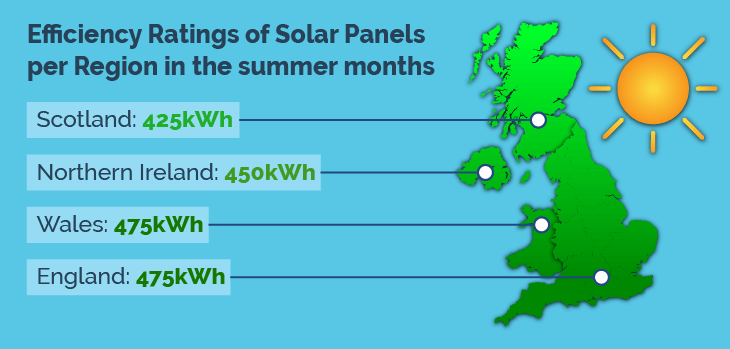
Solar panels in the UK generally have high efficiency levels, reaching ratings of up to 20%. This is mostly the same as in other parts of the world where solar panels can be installed. Considering that the highest efficiency levels of solar panels are around 23%, 20% efficiency for solar panels in the UK is a great percentage.
The efficiency of solar panels in the UK is due in large part to the moderate climate. In addition, while solar panels may be at their most efficient during sunny periods, they do not require direct sunlight to generate energy. As a result, your solar panels can produce energy efficiently year-round, even during the UK’s cloudy winters.
That said, there are some differences in the power output of solar panels depending on where in the UK they are installed. For instance, a 4kW solar panel system will generate varying levels of energy throughout the year based on where your home is located. In London, they can produce up to 475 kWh in the summer months, while in Manchester the same system can generate about 400 kWh in the same period.
Solar panel efficiency can also vary from region to region. This is due to how solar panel angle and orientation affect sunlight reception. The best angle for solar panels in the UK is usually 30 to 50 degrees on a south facing roof. This optimises sunlight year-round, offering the best sunlight angles as the sun changes positions and as seasons change.
This has to do with the weather conditions specific to each area in the country. However, don’t let the reduced figures put you off from installing solar panels if you live in a region that can impact the output of your system. It will still generate plenty of usable energy for your home and help you slash your yearly electricity bills, regardless of where you live.
How many solar PV panels do you need for your household?
The number of photovoltaic panels you will need for your solar system depends on your energy consumption requirements. To determine this, you will need to take into account the size of your home, as well as the number of people in your household.
- For a small home with 1-2 people: A 3kW solar panel system -> 8 panels (350W panels)
- For a medium home with 3-4 people: A 4kW solar panel system -> 10 panels (350W panels)
- For a large home with 5+ people: A 6kW solar panel system -> 16 panels (350W panels)
Your selection of PV panel size is generally determined by availability and based on what local installers have in ready supply. For homeowners, the more important decision is connected to the size of the overall array (e.g., how much total power and thus energy the PV array will produce). This decision will be based in part on access to money to purchase the system. In general, you will want to maximise the size of your array to cover as much of your load as possible.

Joshua M. Pearce is the John M. Thompson Chair in Information Technology and Innovation. He holds appointments at Ivey Business Schooland the Department of Electrical & Computer Engineering at Western University. He runs the Free Appropriate Sustainability Technology research group.
Hopefully you now have a better indication of how many solar panels your household requires. However, before deciding to install solar panels for home usage, you will also want to carefully weigh their advantages and disadvantages.
Advantages of solar panels
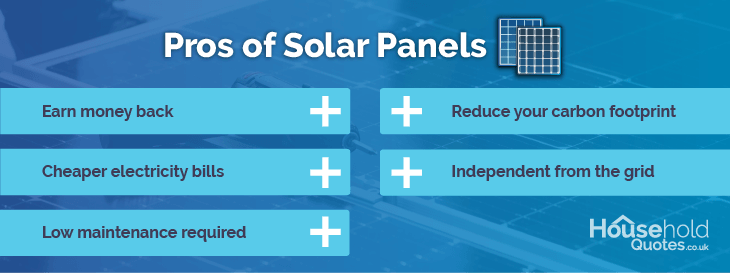
- Earn money back: By selling any excess electricity generated by your solar panels, you can receive payments per kilowatt/hour sold to the grid.
- Cheaper electricity bills: Your solar panels will generate free green energy for your home, allowing you to avoid overspending on your yearly energy payments.
- Low maintenance required: Once installed, you will need to ensure that your solar panels are clean of any debris and that they haven’t been damaged. Aside from this, they can function properly with minimal effort on your part.
- Reduce your carbon footprint: Solar panels are a great sustainable energy source that can reduce your home’s dependence on fossil fuels.
- Independent from the grid: Because solar panels can generate enough electricity to power your home year-round, you will not need to rely on the grid. To ensure independence from the grid, you will need to pair your solar system with a solar battery that can store energy for later use.
If you are ready to reap the benefits of solar panels, you will want to find a trusted solar panel installer to work with. Instead of spending hours browsing through reviews on your own, let us help you. With our simple form, you can request free, no-obligation quotes from up to 4 local solar panel installers vetted by us in just 30 seconds! You can then choose the specialist you want to work with and find the best deal for your new installation.
- Quotes from local installers
- Payment by finance available
- Save up to £915 per year
It only takes 30 seconds

Disadvantages of solar panels

- Significantly more efficient during the daytime: Your solar panels will produce more energy during the day, which means that you might need to use electricity from the grid when it’s dark out.
- High initial costs: Solar panels can be a significant investment, as their price and installation costs are quite high.
- Solar panel placement: Some roof types and orientations might affect the optimal performance of your solar panel system.
Which type of solar panel cells are the best for UK households?
The solar cell types most commonly used in homes across the UK today are monocrystalline solar panels, polycrystalline solar panels, and thin-film solar panels.
Monocrystalline solar panels
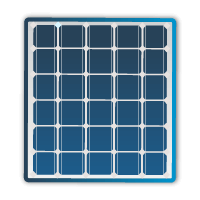
This solar panel type is made of one piece of silicon, which is then sectioned into wafers. This allows electrons to flow easily through the panel. As a result of their structure, monocrystalline solar panels are the most highly efficient option for domestic use.
Because of all their benefits and their complex manufacturing process, monocrystalline solar panels tend to be quite expensive.
Polycrystalline solar panels
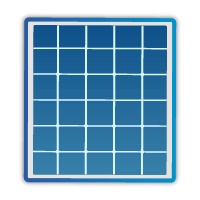
These panels are created by melting silicone pieces together to produce the solar cells. This leads to less ease when electrons flow through the panel. As a result, the efficiency rate of polycrystalline solar panels is lower.
However, they are easier to manufacture than monocrystalline solar panels, meaning that they are also a more cost-effective option for homeowners looking for cheap solar panels.
Thin-film solar panels

These panels are produced by layering films of photovoltaic (PV) material onto a substrate that can yield a flexible panel. The thin-film cells that can be used include silicon, cadmium, and copper. This makes them a great option for areas with higher temperatures. However, thin-film solar panels tend to be the least efficient option.
Thin-film solar panels are fairly easy to manufacture and are more cost-effective in terms of the materials used. As a result, these solar panels are also the cheapest option on the market today.
The best solar panel system for your UK home
Before installing solar panels for your home, you will want to know what the best solar panels in the UK are. We have compiled a list of some of the most highly-rated solar panel models on the market. In no particular order, here are 10 of the best solar panels available in the UK today:
| Solar Panel Manufacturer and Model | Power Output | Efficiency (%) | Temperature Coefficient | Performance Degradation Rate | Warranty Period |
|---|---|---|---|---|---|
| Project Solar Evolution Titan 445 | 445W | 21.4% | N/A | N/A | Lifetime (99.9 years) |
| REC Alpha Pure-R | 430W | 22.3% | -0.24 %/°C | 0.35% per year | 20-25 years |
| SunPower Maxeon 6 | 425W | 22% | -0.27% / °C | 0.2% per year | 25-40 years |
| REA Solar Fusion 2 | 465W | 22% | - 0.27% / ° C | N/A | 25 years |
| Sharp NU-AF | 370W | 19% | - 0.38% / °C | 0.7% per year | 10-25 years |
| Sunpower Maxeon 3 | 400W | 21.2% | - 0.27% / ° C | 0.2% per year | 25-40 years |
| SOLARWATT Panel Vision GM 3.0 Pure | 375W | 20% | - 0.26% / °C | N/A | 30 years |
| Panasonic EverVolt EVPV370K | 370W | 21.2% | - 0.26% / °C | N/A | 25 years |
| Amerisolar AS-6P30 | 280W | 17.5% | - 0.41% / °C | 0.5% per year | 12 years |
| Sharp SunSnap ND-F2Q235 | 235W | 14.4% | N/A | N/A | 12-25 years |
Interested in some of these models but still want to know more before committing to one? Your best bet is to consult a solar expert who can give you more details about the solar panels they install. They can also instruct you on which solar panel manufacturers will be the best for your home.
If you are ready to talk to a specialist but have no clue where to find one, don’t worry - we’ve got you covered. We work with a broad network of reliable solar panel installers who can help you start your green energy journey. To contact them, simply fill in our 30-second form and request quotes for a solar panel installation. You will then hear back from up to 4 installers operating in your area. Just click below to get started now!
- Quotes from local installers
- Payment by finance available
- Save up to £915 per year
It only takes 30 seconds

Solar panel installation: What is involved?
To fully enjoy the benefits of your domestic solar panels, you will need to make sure that they are installed properly. The key to a high-quality installation is to work with certified and reliable solar panel installers.
After finding the professionals who will work on your home, this is what the solar panel installation process will look like:
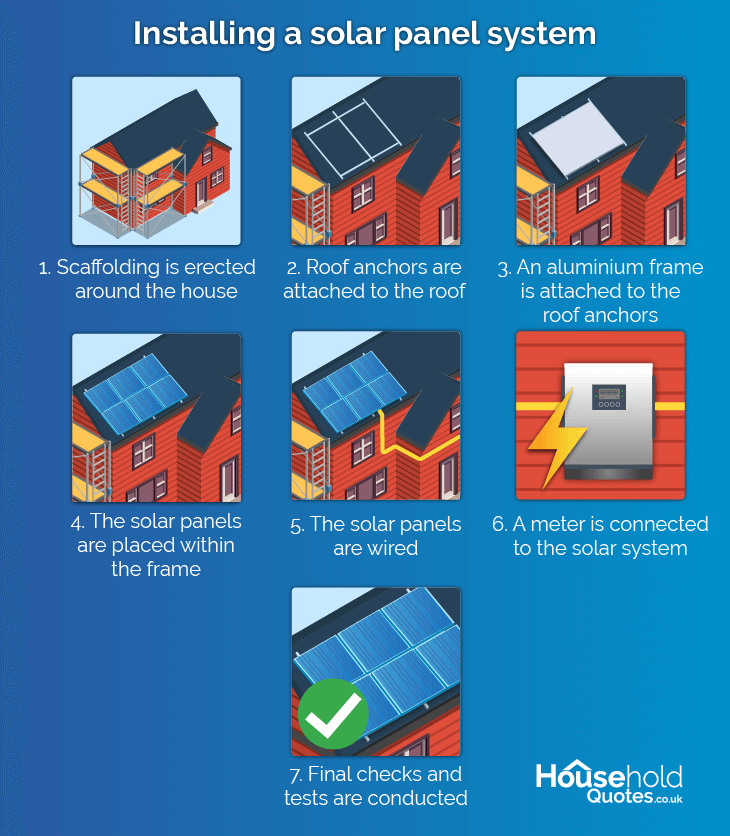
- Step 1: The installers prepare scaffolding around your house to be able to access your roof.
- Step 2: Roof anchors are attached to the surface of your roof. These will hold the solar panels in place.
- Step 3: An aluminium frame is attached to the roof anchors.
- Step 4: The solar panels are placed within the aluminium frame and secured firmly.
- Step 5: The solar panels are wired to connect to the inverter, which is the part of your system that transfers the energy your solar panels generate to your home for use.
- Step 6: A generation meter is connected to your system so that it can measure how much energy your solar panels produce.
- Step 7: The installers conduct final checks and test that your solar panel system functions optimally.
Once all these steps are finalised, you are ready to make use of and enjoy your new solar panel installation.
Find the best solar panel suppliers near you
If you are ready to install solar panels for your home and make the most of this energy source, the next stage in the process is to find a solar panel installer you can trust.
In most cases, this is easier said than done. It can take hours, or even days of stressful research to find installers that operate in your area. And on top of all that effort, you might not even end up finding the right installer for you.
Fortunately, you can avoid the frustration of wasting your time on fruitless searches and reach out to reliable solar experts from our broad network in just 30 seconds!
By comparing the information you receive, you can choose the installer you want to work with and find the best deal for your new solar panel installation.
By installing the best innovations in your home, you will be future-proof and have a safe place to live in. Upgrade your home so it's ready for the future.
All quotes are completely free and come with no obligations to commit to an installer. Just click below to request solar panel quotes today!
- Quotes from local installers
- Payment by finance available
- Save up to £915 per year
It only takes 30 seconds

Frequently asked questions
The exact number of panels you need depends on different factors such as the size of your home and the number of people living in it. For a 3-4 person household, a 4kW solar system with 10 350W panels would be suitable.
Yes, it is important to notify your electricity supplier that you have installed solar panels. This way, they can ensure accurate billing and efficient grid management. What is more, sharing this information with your supplier can also offer you a range of advantages.
When you install solar panels, your insurance should continue to cover your home under the current terms. However, you will want to check with your provider for information tailored to your situation before proceeding with the solar panel installation process.
With the proper care and maintenance, solar panels in the UK can operate efficiently for up to 25 years. To ensure that you can enjoy the benefits of solar technology for as long as possible, you will want to choose some of the best solar panels on the market today.
Generally speaking, you will not require planning permissions to install solar panels. However, this varies depending on the type of home you live in. You can consult a solar panel installer or local authorities for more guidance on any permissions you might need.

Sabria is a writer committed to making even the most complex information about sustainability and energy efficiency easily accessible to homeowners looking to make greener choices. With a background in literary studies, she has a wealth of experience when it comes to academic research and writing.
- Solar Panels for Your UK Home: A Comprehensive Guide
- Are solar panels for homes worth the investment?
- How do solar panels work?
- How efficient are solar panels in the UK?
- How many solar PV panels do you need for your household?
- Which type of solar panel cells are the best for UK households?
- The best solar panel system for your UK home
- Solar panel installation: What is involved?
- Find the best solar panel suppliers near you
- Frequently asked questions
